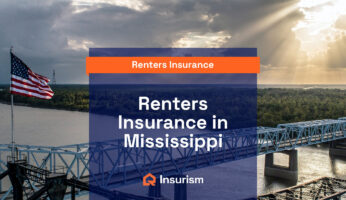Table of Contents
What is a named perils policy?
A named perils policy only covers accidents and disasters (referred to as perils) that are specifically listed in the policy’s terms.
In other words, in named perils policies, disasters aren’t covered by default. They have to be named and described in the policy for your insurer to pay for the damage they cause.
How named perils policies work
If you read a standard renters insurance policy, you’ll find two lists of perils:
- Covered perils
- Excluded perils
These lists will be located near the front of the policy, possibly under different names — for instance, in your policy, “covered perils” might be called “Perils Insured Against” or “What We Cover.” The specific language isn’t important; the point is that, if you have a named perils policy, your insurer will only pay for damage caused by something in that list of covered perils.
If something isn’t listed as a covered peril, it doesn’t really matter whether it’s listed in “excluded perils” or not. If you have a named perils policy and it doesn’t specifically call out an accident as a covered peril, your provider won’t pay for it.
What named perils policies cover
Fortunately, most named perils policies are pretty comprehensive. Named perils renters insurance policies typically cover:
- Theft
- Vandalism
- Fire
- Lightning
- Smoke
- Explosions
- Windstorms
- Hail
- Ice or snow accumulation
- Vehicles
- Aircraft
- Falling objects
- Riots
- Volcanic eruptions
- Short circuits
- Burst pipes
- Frozen pipes
- Overflow of water or steam
To find out what your renters insurance covers, check the “covered perils” list in your policy, which you can find using the table of contents on the first page. Alternately, you can just read our article on what renters insurance usually covers — your policy probably won’t be substantially different.
Most major carriers only offer “named perils” renters insurance policies
Throughout the rest of this article, we compare named perils policies with the alternative, all risks policies, which are more comprehensive. Although it’s sometimes possible to choose between the two types, most national brand carriers (like Allstate and State Farm) only offer renters insurance with named perils coverage.
Realistically, named perils coverage is fine for most people. Many of the companies that offer all-risk renters insurance policies cater to high-net-worth clients who need extra coverage for their valuables. If you’re looking to insure a relatively “normal” amount of stuff (i.e. if you’re like the average renter and your possessions are worth about $30,000), you probably don’t need an all-risk renters insurance policy.
However, if you’re wealthy and thinking about buying insurance from a regional or specialty insurer, you should understand the advantages and disadvantages of each type of policy.
Pros and cons of named perils policies
Named perils policies have several pros and cons:
Pros
- Because named perils policies are less comprehensive than all-risk policies, they’re usually cheaper.
- Named perils policies still cover most common household disasters, like burst pipes and kitchen fires. They cover most of the events that you’re likely to encounter as a renter.
Cons
- Although they cover common disasters, named perils policies don’t cover unpredictable freak accidents. For instance, if a pack of raccoons trashes your living room, your insurer probably won’t pay for it because “animal damage” isn’t a covered peril in most policies.
What is an all-risk policy?
An all risks policy covers accidents and disasters of all types, except for events that are specifically excluded by the policy terms. This type of policy is also known as an open perils, comprehensive risks, or special perils policy.
A common misconception about all-risk policies is that they protect you from every kind of risk. Unfortunately, the name is slightly misleading — as mentioned, they still have certain exclusions. In most policies, you can find these in a section named something like “Excluded Perils” or “Losses Not Covered.”
What all-risk policies exclude
Standard renters insurance policies exclude:
- Floods
- Earthquakes
- Infestations (like bed bugs)
- Sinkholes
- Drain or sewer backups
- Appliance failure caused by ordinary wear-and-tear
- Sump pump failures
- Pollution
- Damage from war
- Government seizures
- Intentional damage and negligence
Pros and cons of all-risk policies
All-risk policies have their advantages and disadvantages:
Pros
- All-risk policies are more comprehensive than named perils policies. They cover unusual situations that you couldn’t have predicted (like those marauding raccoons that we mentioned above).
Disadvantages
- All-risk policies are usually more expensive than named perils policies.
- They’re also not that much more comprehensive, because they specifically exclude a lot of relatively common disasters. For instance, all-risk policies still usually exclude bed bugs and floods.
What’s the difference between named peril policies and all-risk policies?
All-risk policies cover a broader range of accidents and disasters than named peril policies. Named peril policies make up for this difference by being cheaper.
Named perils renters insurance still covers a broad range of disasters, so in practice, the two types of policies are more similar than you might expect. That’s why most major insurance companies only offer named perils renters insurance.
Unless you buy renters insurance from a specialty insurer or you contact an independent insurance agent and specifically request an all-risk policy, you’ll probably end up with a named perils policy. That’s fine — there’s nothing wrong with shopping around for an all-risk policy, but it’s not necessary for most people.
Should I get a named perils or an all-risk policy?
Most people will do fine with a named perils policy, but in limited circumstances, it’s worth looking for more comprehensive coverage.
When should I get a named perils policy?
If you’re like the average renter — meaning that altogether, your possessions are worth about $30,000 — you’re probably fine with a named perils policy. Realistically, your insurance will still cover most of the perils that you actually have to worry about, like fires and burglary.
It’s possible that someday your possessions will be destroyed by a disaster that only an all-risk policy would have covered, but it’s unlikely.
When should I get an all-risk policy?
If your possessions are significantly more expensive than the average renter’s, it might be worth getting an insurance agent to help you find an all-risk policy.
It’s still unlikely that your things will ever be damaged by something that a named perils policy wouldn’t have covered, but worrying about freak events makes a lot more sense when they could potentially cause $100,000 of damage instead of $1,000.
Named perils and all-risk coverage in the same policy
If you have a few particularly expensive possessions, like a high-end china tea set, you can ask your insurer whether you can buy a scheduled coverage or personal articles rider to add all-risk coverage for those items.
This has the advantage of comprehensively protecting the things you really care about, without requiring you to shop around for an all-risk renters insurance policy.
Related Questions
- What is guest medical coverage in renters insurance?
- What is a sub-limit in renters insurance?
- Does renters insurance cover home-based businesses?
- Does renters insurance cover gold or silver bullion?
- What does "dependent in the care of" mean in renters insurance?
- Does State Farm renters insurance cover hotel stays?






